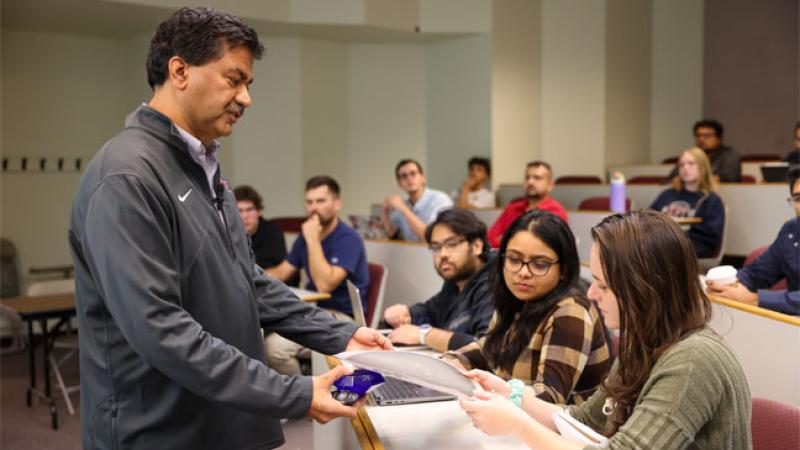
With the CHIPS and Science Act, the United States’ commitment to becoming a global leader in semiconductor manufacturing once again was formalized. After the recent global chips shortage, combined with the pervasiveness of chips in our everyday products from refrigerators, to cars, to watches, it is now a national priority to ensure that semiconductors are produced domestically for economic and security reasons.
Rensselaer Polytechnic Institute is committed to educating the next generation of semiconductor experts. Building upon its 200-year history in technological education, Rensselaer is partnering with leaders in the semiconductor industry to offer curricula tailored to workforce needs.
In Rensselaer’s latest offering this fall, James Lu, Ph.D., professor and curriculum chair in electrical, computer, and systems engineering (ECSE), enlisted the help of 23 leading industry experts from 10 semiconductor companies to co-teach Topics in Advanced Materials, Metrology and Equipment for Semiconductor Manufacturing.
“There has been much interest in this class,” said Lu. "Students at any university or community college rarely, if ever, have the opportunity to learn about the technological advancements in materials, metrology, equipment, automation, data analytics, and infrastructures that enable semiconductor manufacturing.”
Technical leaders from industry-leading companies and organizations such as IBM, Applied Materials, ASML, Tokyo Electron, DuPont, Entegris, GlobalFoundries, Screen, SUNY UAlbany CNSE, and more, together with Lu, bridge some of the academia-industry gaps by teaching students these critical skills and knowledge and sharing their first-hand, real-world experience, all of which the semiconductor industry urgently needs.
“About 70 students specializing in a broad range of engineering disciplines are participating. Half of the students are graduates and half are undergraduates. It is unusual for a topics course to have such a high enrollment with such a diverse student body. I expect that this collaboration will become another model for academia-industry collaboration in Education and Workforce Development (EWD) that can be scaled nationally,” said Lu.
This course comes on the heels of Topics in Microelectronics Manufacturing, which was first offered in the spring. It was co-taught by Lu and a team of 11 leading industry experts from GlobalFoundries, and it was received overwhelmingly positively by students. Additionally, GlobalFoundries lecturers were impressed by the high quality of student work and how much they learned.
“These new semiconductor manufacturing courses at Rensselaer represent the union of academia and industry to address real-world needs,” said Shekhar Garde, Ph.D., dean of Rensselaer’s School of Engineering. “Our ability to return semiconductor manufacturing to the United States hinges on the development of the engineering talent needed to sustain and elevate the industry. We look forward to these courses serving as models that can be scaled nationally to meet that need.”
The new course offerings are a result of Rensselaer’s participation in the American Semiconductor Innovation Coalition (ASIC), which comprises over 200 corporations, academic institutions, national labs, and nonprofit organizations working toward increasing domestic semiconductor manufacturing, establishing a secure supply chain, introducing next-generation technology efficiently, and ensuring workforce needs are met now and in the future. It has been estimated that the U.S. will need approximately 50,000 new semiconductor engineers and technicians in the next five years, a number that far exceeds current graduation rates nationwide.
“Academia-industry collaboration adds cutting-edge, real-world content to the fundamentals taught in core courses,” said Dave Medeiros, senior director of engineering in the CTO Office at Entegris. “We hope that these courses inspire students to become the next generation of semiconductor manufacturing engineers so they can use these skills to strengthen the semiconductor industry in the United States. Their advanced skills will make them highly sought-after talent by companies across the country.”
In a class assessment, students agreed that the academia-industry collaboration was successful and beneficial, and the vast majority plan to pursue careers in the microelectronic industry. These two courses are just the beginning: Rensselaer is also developing a series of curricula and programs, including concentrations, minors, certificates, master’s degrees, short courses and workshops, training for working professionals, and more to enhance its already robust offerings in micro and nanoelectronics.
Written By Katie Malatino


